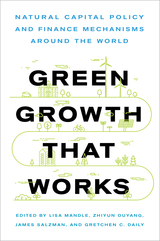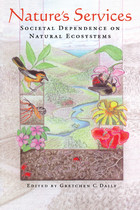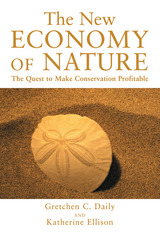
Green Growth That Works is the first practical guide to bring together pragmatic finance and policy tools that can make investment in natural capital both attractive and commonplace. The authors present six mechanisms that demonstrate a range of approaches used around the globe to conserve and restore earth’s myriad ecosystems, including:
- Government subsidies
- Regulatory-driven mitigation
- Voluntary conservation
- Water funds
- Market-based transactions
- Bilateral and multilateral payments
Pioneered by leading scholars from the Natural Capital Project, this valuable compendium of proven techniques can guide agencies and organizations eager to make green growth work anywhere in the world.

Life itself as well as the entire human economy depends on goods and services provided by earth's natural systems. The processes of cleansing, recycling, and renewal, along with goods such as seafood, forage, and timber, are worth many trillions of dollars annually, and nothing could live without them. Yet growing human impacts on the environment are profoundly disrupting the functioning of natural systems and imperiling the delivery of these services.
Nature's Services brings together world-renowned scientists from a variety of disciplines to examine the character and value of ecosystem services, the damage that has been done to them, and the consequent implications for human society. Contributors including Paul R. Ehrlich, Donald Kennedy, Pamela A. Matson, Robert Costanza, Gary Paul Nabhan, Jane Lubchenco, Sandra Postel, and Norman Myers present a detailed synthesis of our current understanding of a suite of ecosystem services and a preliminary assessment of their economic value. Chapters consider:
- major services including climate regulation, soil fertility, pollination, and pest control
- philosophical and economic issues of valuation
- case studies of specific ecosystems and services
- implication of recent findings and steps that must be taken to address the most pressing concerns

Why shouldn't people who deplete our natural assets have to pay, and those who protect them reap profits? Conservation-minded entrepreneurs and others around the world are beginning to ask just that question, as the increasing scarcity of natural resources becomes a tangible threat to our own lives and our hopes for our children. The New Economy of Nature brings together Gretchen Daily, one of the world's leading ecologists, with Katherine Ellison, a Pulitzer-prize winning journalist, to offer an engaging and informative look at a new "new economy" -- a system recognizing the economic value of natural systems and the potential profits in protecting them.
Through engaging stories from around the world, the authors introduce readers to a diverse group of people who are pioneering new approaches to conservation. We meet Adam Davis, an American business executive who dreams of establishing a market for buying and selling "ecosystem service units;" John Wamsley, a former math professor in Australia who has found a way to play the stock market and protect native species at the same time; and Dan Janzen, a biologist working in Costa Rica who devised a controversial plan to sell a conservation area's natural waste-disposal services to a local orange juice producer. Readers also visit the Catskill Mountains, where the City of New York purchased undeveloped land instead of building an expensive new water treatment facility; and King County, Washington, where county executive Ron Sims has dedicated himself to finding ways of "making the market move" to protect the county's remaining open space.
Daily and Ellison describe the dynamic interplay of science, economics, business, and politics that is involved in establishing these new approaches and examine what will be needed to create successful models and lasting institutions for conservation. The New Economy of Nature presents a fundamentally new way of thinking about the environment and about the economy, and with its fascinating portraits of charismatic pioneers, it is as entertaining as it is informative.
READERS
Browse our collection.
PUBLISHERS
See BiblioVault's publisher services.
STUDENT SERVICES
Files for college accessibility offices.
UChicago Accessibility Resources
home | accessibility | search | about | contact us
BiblioVault ® 2001 - 2024
The University of Chicago Press









